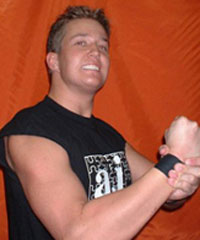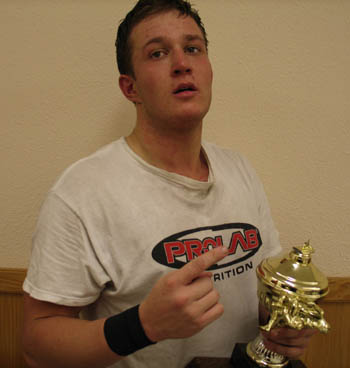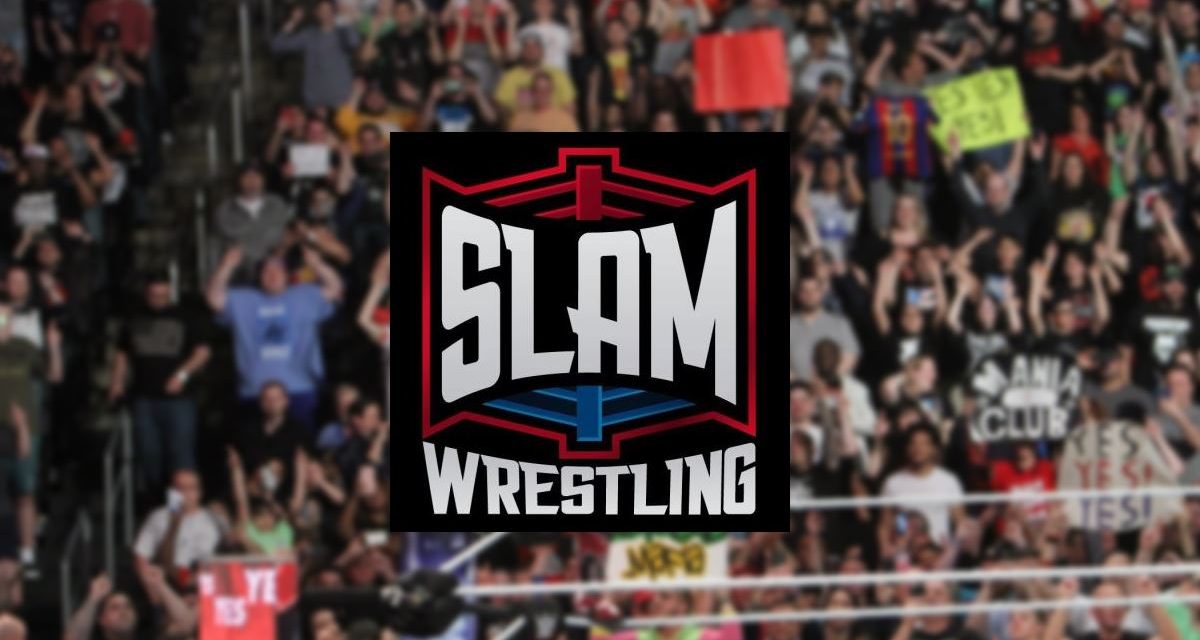VANCOUVER — The Pacific Cup is a championship of the elite — it’s been won by big wrestlers and small wrestlers, high-flyers and savvy technicians — but this year was the first time the two-day tournament had been won by a legally blind wrestler, the 6’1″, 213-pound Aaron Idol.
Idol is legally blind because of a condition known as Stargardt’s disease — a macular degenerative disease that essentially erodes the central vision responsible for detail perception. “I first noticed it when I was in Grade One I think,” Idol said in an interview with SLAM! Wrestling. “We had to read off the board from our desks. They sent me for eye tests and discovered my condition.”

Aaron Idol
His condition may have diminished his eyesight but did not take away his love and passion for wrestling. In fact, Idol had spent most of his life learning about wrestling. It’s a fair statement to say that wrestling has changed his life and the first of those changes would come the evening, when at eleven years old, his parents finally relented and let him watch wrestling on T.V.
“The first time I saw wrestling,” the 24-year old native of Burnaby, B.C. recalled, “I was pretty much obsessed with it. I thought ‘this is awesome’, but soon I thought being a wrestler would be cool too. That’s all I thought about as a career. Every other career I thought of was a back-up to wrestling or wouldn’t be as good.”
“There was pretty much always wrestling in some capacity in my life. I remember even after I went to university after high school — after two years, I was so tired of university because all I could think about was wrestling.”
His obsession led him to the doors of ECCW’s House of Pain wrestling school back in 2000. His decision to train to become a wrestler was a risky one — even wrestlers with full and complete vision are at risk for injury — Idol’s condition only heightened that risk. One wonders why Idol would even bother to take that chance in the first place.
“I think because wrestling was always what I wanted to do and I wasn’t going to let anything stop me, no matter what that ‘anything’ was,” Idol suggested. “The vision was secondary to my passion for wrestling. I loved wrestling enough to try and figure something out.”
The blindness, while not total, is still a disability — one he must contend with every time he steps outside his house and into an unfamiliar place. But in the ring, he doesn’t see the blindness as a hindrance. “Wrestling-wise, I don’t see it as a weakness. Although, I suppose in a tag match or something, if everyone wore black jumpsuits, that might throw me off a bit.” He laughed.
All the jokes about blind wrestlers were put away when Idol started training. He soon proved that not only could he wrestle, but he seemed to have a natural talent for it. Still, training to become a wrestler is a taxing and grueling experience, yet somehow Idol persevered and graduated in 2001.
He had no way of knowing what the future had in store for him — that people would make a point to bow down to him as he made his way to the ring, or how popular he would eventually become.
“Those first matches I was having,” Idol remembered, “I was pretty much focused on not tripping on my way to the ring, remembering to do this, remembering to do that, remembering who and where I was. I was the little man in the sailboat in the ocean. I just wanted to get through the match and hopefully be alive at the end of it.”
Wrestling when you can’t quite see properly adds a challenge to an already difficult sport. When he’s in a match, what, if anything, does he see and how is he able to execute any of his wrestling moves?
“I can see pretty good detail-wise for a couple of feet,” Idol explained. “In the ring, I can see the ropes once I get to them, but sometimes I can’t see the ropes on my way to them. The ring is a set amount of distance and I know it very well. Before the show, I check out the ring ropes and any obstacles that are outside the ring.”
For Idol, once in the ring, it is more like he is wrestling shapes than people. “And as far as seeing my opponents, I don’t have to recognize what they look like to wrestle them or beat them.”
His drive and ambition was shown early with his early matches. Idol said he had set the bar for himself pretty high and wanted to show that, despite his disability, he had some talent and was willing to work hard.
“Back then, I was just thinking show to show,” he said. “I was just doing my best and I didn’t know if my best was good enough to get me booked on the next show.” It turned out his wrestling was good enough — maybe too good.
Earlier in his career — back when he had long hair and was still a fresh graduate of the House of Pain — he and another of his fellow graduates, White Tiger, stunned the crowds at Bridgeview Hall in Surrey with a series of matches that really showcased the duo’s impressive talents.
Unfortunately, this got Idol into a bit of trouble — although his matches were solid, even great — performances, they took place in the middle of the card and took some of the wind from the sails of the main event. Looking back now, Idol can see how his extreme ambition for the sport he loves clouded his judgment.
“I think that was an overall naivety as far as understanding the overall approach to a wrestling card,” Idol conceded. “At that time, we were thinking, what can we do to make sure we are booked on the next show? We thought, let’s blow them away and give them everything we can think of and make it really cool.”
“What we weren’t thinking was if you are the third match on the card and do 16 finishers, the main event is going to have a problem when they hit one and the crowd just sits on their hands. So it was kind of a naïve, maybe even a selfish outlook we had, but it wasn’t intentional.”
Wrestling is still all Idol thinks about — his success has not been able to change that. But in searching for the formula for Idol’s success, he is hard-pressed to pinpoint exactly what it is that has separated him from all the other graduates in that Class of 2001, some of whom have disappeared from the wrestling scene altogether.
“I could say I worked harder or that I devoted more to it, but I am not sure I can say that honestly,” he said. “I have devoted as much as I can to wrestling, watched as many tapes as I can, practiced as much as I can, been in the ring as often as I can, have taken as many bookings as I can, but I don’t know if I really have an answer to what separates me from the others in that class.”
“I know as soon as I get a hold of a tape of my most recent match, I watch it right away so I can see what works and what doesn’t. I am constantly working to improve. Because when you think, ‘yeah, it’s good enough’, or ‘I’ll take the night off’ — two lines I really hate — you can get complacent and that’s bad. I don’t know … maybe that’s a cheesy answer to the question.”
Idol pondered the question further. “Wrestling is like a business, just like anything else. I don’t think you get into opening a furniture store thinking, ‘this furniture thing is going to be easy, I probably won’t have to work that hard.’ You go into it with a business plan and that’s what I have done.”
“I got into this knowing I was going to work really hard. Because what’s the point of looking back in twenty years and saying I could maybe have made it if only I had worked a little harder?”
You don’t become the Pacific Cup Champion by slacking off, something Idol has never done. His matches — usually super-intense bouts with action taking place both in and outside of the ring — have become synonymous with word physical. Idol leaves it all in the ring, a cliché in this business perhaps, but one Idol had made his own personal mantra.
“Whenever I go into any match with anybody, I’m not just trying to challenge them, I am trying to challenge myself,” Idol explained. “I don’t think you get anywhere going along at 50% speed.”
Maybe not, but some contend Idol is too intense and maybe even a little stiff. Dave Richards, a fiery up-and-comer in ECCW, has also garnered a similar reputation and says he and Idol are just, well, misunderstood.
“Idol is not stiff, he’s passionate,” Richards said. “He puts his heart into every match. For him, wrestling is life. He doesn’t want ‘nights off’ or ‘easy matches’. He wants to sweat, to fight, to give everyone their money’s worth. You can’t put a price, a push, or a title on something like that. Working Idol is something I always look forward to — he and I share a common respect for the realistic, hard-fought matches. His fighting spirit will take him far.”
“I am more intense than the average wrestler in ECCW,” Idol admitted. “I want to have the best matches I can, which means being as intense as I can. And if being as intense as I am is called crazy, then I am happy to put on the straitjacket.” Idol said a strong and dedicated work ethic is part and parcel of what he thought wrestling was all about from the very start.
“I kind of assumed getting into wrestling that I might get hurt, that I will probably be sore after every match and to be good at this, it would be a lot of work. I don’t think anyone who makes it — whether in the WWE, in Japan or wherever — will tell you it’s easy. I don’t think you can just sit around and get somewhere.”
To that end, Idol said, he has dedicated himself to working as hard as he can as often as he can. “I have been working hard no matter what match — opening match or main event, title shot or not, in front of 50 people or 500 — everybody gets the same match which is the best match I can give them.”

Aaron Idol backstage with the Pacific Cup just after his win. -photo by Gregory Milne
The win in the Pacific Cup, held April 23-24, in Surrey and Vancouver, confirms that his determination wasn’t wasted. “Winning the Cup proves my hard work is starting to pay off. Not that it wasn’t before,” he was quick to add, “because fan reaction has been the payoff for me before and will continue to be, but it’s nice to be in a position to help the company as well and this is the first step in that direction.”
It’s hard to know what he means when he says “help the company.” That Idol has drawing power has already been established — many of his fans travel to different cities (like Abbotsford and Port Coquitlam) just to see him wrestle.
The fans clearly don’t care that he is blind, but what do his peers think? Being blind separates Idol from all of the other guys in the locker room. How does he deal with that and does it affect his performances?
“It doesn’t really bother me being different,” Idol answered. “I mean everyone in the locker room is different and has a different background coming in. Really, the only thing that bothers me is if my poor vision is mistaken by someone to be me ignoring them, which has happened.”
“It’s difficult, simply because even if someone is just three our four feet away, I really can’t tell whether they or talking to me or someone else nearby. I try and make it known that if I ignore someone, they should not take it personally.”
But what about the promoters? Have they ever shown concern to him about having a blind wrestler as part of their roster?
“Not to my knowledge,” Idol replied. “I would say that out of respect for the business, I would retire myself before anyone had to voice a concern about my ability to remain safe in the ring.”
None of the wrestling promoters we talked to had any such concern. ECCW promoter Mark Vellios was asked for his impression of the 2005 Pacific Cup Champion. “Aaron Idol is incredible at his style of wrestling. He is able to pull a good match off with almost anybody. He takes everything to heart and gives 100% each time out.”
Vellios says he is not at all concerned with Idol’s blindness. “He is the most underrated and under-utilized talent in the Pacific Northwest.”
Despite these accolades, Idol said this is all what being part of a team is all about. He wants everyone to be happy with his work — especially himself — but also answers to an even more personal responsibility.
“I want to give the fans something to remember,” he elaborated. “The fans will remember a good match for the rest of the night, probably for the rest of the week and maybe even the rest of the month. And for my portion of the show, I want to make sure the fans get their money’s worth.”
He is willing put his body on the line multiple times to thrill the fans — he figures it’s a risk he might as well take. “I could quite easily get hit by car crossing the street because I thought the light was green when it was actually red, so why not?”
To listen to him talk like this — about his place in the company, about his responsibility to the fans, makes him sound like a veteran, like someone who takes the business as seriously as those who have been it for decades. This brings up the question of ego.
In a recent interview, Scotty Mac, three-time ECCW champion, suggested that Idol “has a pretty big ego too.” When confronted with this quote, Idol struggles to see exactly what Scotty Mac was talking about.
“Perhaps I do have a big ego and I am in denial,” he responded. “I don’t really know. To some extent, ego is a weird thing to think about because you have to be confident in kind of an arrogant way to be able to do your own thing and keep it going and not listen to people who call you an idiot.”
It sounds like he’s getting a bit personal now and if anyone did call Idol an “idiot” they are likely eating their words now. Idol’s Pacific Cup win was impressive — Idol had been determined to have a better showing than last year, when he admits he got caught by veteran Tony Kozina and was eliminated in the first round.
“It was a great match, probably one of my greatest matches all year, but I was disappointed I didn’t go farther.”
This year he did. He will forever be known as the winner of the 2005 Pacific Cup Tournament, a spot held by only an elite few. But the win does not afford him a break from his wrestling life — he wants some retribution for what happened at the end of the tournament and he’s got his eye on the ECCW Heavyweight championship. If there was pressure before, it can only double now that he belongs to the exclusive club of Pacific Cup winners. Can he handle what lies ahead?
“There’s always pressure in every match,” Idol answered. “As far as delivering goes, that’s one thing I have always been pretty confident I am going to do, just because that’s what I have been thriving on — delivering every match. I’d like to think whatever spot I get put in, I will deliver what is needed. Delivering under pressure is what separates the best from the rest. If you choke on a regular basis, you’re not much good to anybody.”
Idol’s future is an unwritten book, but you can feel it’s going to be a good one. Despite his blindness, he has silenced the critics and risen as a star in the ranks of ECCW, and neighbouring promotions. He has recently achieved something few wrestlers ever do, and did it despite not being able to see his opponents as clearly as they could see him. It makes one wonder how good he would be if he had full vision.
“That has haunted me in the past,” he reflected. “How good I would be at _____ if I had proper vision. Because, honestly, I think I would be good at a lot of things if I had decent vision. You can’t separate yourself from that and ask how good I would be if I had full vision because I don’t and I’m the only Aaron Idol you are ever going to get.”

